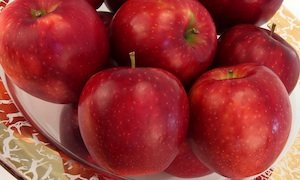Washington State University is looking for an entity to manage the commercialization of the WA 38 apple, which its breeding program developed.
The WSU Research Foundation, which owns the variety, has issued an “announcement of opportunity” inviting individuals, companies, or cooperatives to submit proposals.
The successful applicant will have an exclusive license to manage the commercialization of the variety.
The commercialization plan for WA 38 differs from the one put in place for WSU’s first apple release, WA 2. The Washington Tree Fruit Research Commission negotiated the commercialization rights for WA 2 and handled growers’ applications for trees.
Responsibilities of the WA 38 license holder will include contracting out the propagation of the trees to nurseries and others, sublicensing the variety to growers, managing the trademark, and collecting royalties. It will need to develop a plan for how trees of WA 38 will be marketed to growers and nurseries.
The commercialization plan was drawn up by the Cultivar Licensing Committee, an ad hoc committee set up to advise the university on the release of WSU apple varieties. The committee, whose members include WSU faculty and apple industry representatives, will evaluate applications for the WA 38 license, which are due by May 3.
Patent
The Research Foundation has filed a patent application and is in the process of selecting a name for the variety that will be trademarked. It will also file for International Plant Variety Rights in countries around the world. However, for the time being, the foundation is only looking for entities to manage the variety in Washington. In the future, it will seek partners for managed releases in other countries, according to the announcement.
Applicants will need to provide WSU with a comprehensive commercial plan that ensures that all Washington growers have access to the variety. The royalty scheme will be designed to reward early adopters and provide significant long-term funding for the breeding program.
Brent Milne, chair of the Cultivar Licensing Committee, said both the committee and the university recognize that many growers are excited about WA 38 and anxious to plant trees so they can get fruit to market as soon as possible. However, before growers can do that, nurseries need to establish mother blocks to generate budwood and then propagate trees.
“WSU are keenly aware of the groundswell of interest in the industry for this particular selection,” he said. “With that in mind, they’re moving towards getting everything in place.”
Dr. Kate Evans, WSU’s apple breeder, said it would probably be 2015 before reasonable numbers of trees are available for commercial plantings. Certified virus-tested budwood has gone out to about five or six major nurseries that have expressed interest in the variety, and certified mother trees were planted in 2012. Those nurseries have propagation licenses but don’t have tree-sale licenses, she said.
WSU will provide the license holder with a list of authorized propagators of WA 38 but expects that more propagators will be needed to meet demand for the variety.
The announcement of opportunity can be downloaded at http://treefruit.wsu.edu/research/. The deadline for applications is May 3, and the successful applicant will be notified on June 24. The commercialization program will be implemented as soon as the license agreement is signed on July 22.
For information, contact Tom Kelly at the WSU Research Foundation, (509) 355-1210.
Look in the March 15 issue of the Good Fruit Grower for more information on the commercialization of WSU’s new apple varieties and on how consumers rate WA 2 and WA 38 in comparison with existing commercial varieties.


Leave A Comment